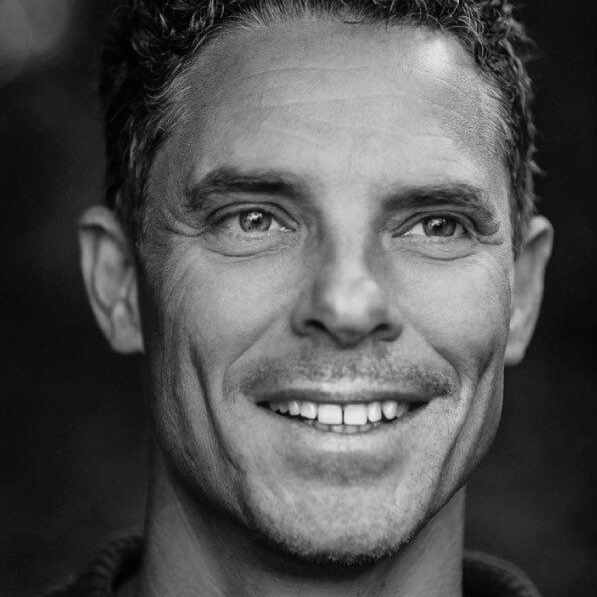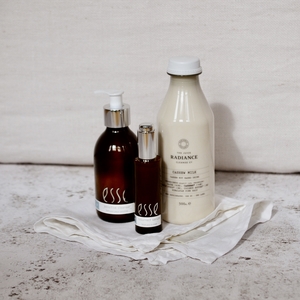Interview with Esse Founder
by Olivia Cartwright,

Esse Skincare as a company really has it all, an emphasis on ethical, vegan and natural ingredients but combined with extensive and complex scientific research and investigation. It is through their tireless ethical dedication and endless curiosity that they birthed such beautiful products without compromising on results. In fact, I would go as far as to say that their products have been amongst the most effective I have tried even when competing against active chemical-based brands.
Esse has been pioneering the probiotic skincare industry since it's conception in 2000. 21 years later, South African Brand Esse are still challenging the conventional view of skin and instead concentrates on nurturing the ecology of the human microbiome.
We had a fascinating conversation with Esse’s incredible founder Trevor Steyn about all things probiotics:
Can you tell us a little about the story behind Esse? How did your personal background as a chemist get you interested in skincare?
When I was younger, I thought that chemistry could solve almost any problem. As my understanding of the biological world expanded, I became less certain. I started to realise that applying simple chemicals to very complex ecosystems often led to unintended consequences … like when you apply DDT to a forest. When the first findings of the Human Microbiome Project came out, I understood that every person is a walking ecosystem of human and microbial cells. That was when I started to apply new lines of thinking to skincare products. Synthetic chemicals are risky, so we focused our research on shifting the ecosystem to support diversity.
When you started researching the traditional industrial beauty industry, what did you find?
The traditional skincare industry has promoted a skin care regime that is quite strange from our point of view. First the cleanse … the skin’s natural oils are stripped off skin and washed down the drain, then tone … the client sprays alcohol to break down barrier function and allow the next step to penetrate the skin. And then moisturise where they try to replace the lost oils with petrochemicals.
Our approach is to minimise disruption of the skin’s microbiome and to do what we can to build barrier function.
We still do cleansers, toners and moisturisers, but they work in very different ways. We generally go against the norms of traditional skincare.
Many people invest in skincare for instant results, that is not the Esse way. Esse looks to sustainable, long term skin health. There is a megatrend of health and sustainability that I think will hold for the foreseeable future.
As head of a pioneering skincare brand, what does a typical day look like for you?
The running of the company is taking up more time as we grow, but my first love is still research. I spend about 4 hours a day on the essentials of keeping things running smoothly and the rest on reading academic papers and other product development.
It’s a real commitment to be a certified organic skincare brand. Why was this so important to you?
In most personal care companies, profit is placed ahead of the environment and also ahead of the long-term health of the client. Esse was formed to show an alternative to “business as usual”.
We are certified organic by EcoCert and we are audited to their standards twice a year. They check that every ingredient is traceable to the farmer and they make sure that our packaging is carefully thought through. It is really helpful to have external oversight. So, when the consumer is looking for organic products, the maxim holds - “if it’s not certified, it’s not organic”.
Why is diversity in our skin system so important? Can you explain the concept of rewilding?
There are many factors in our modern lifestyles that contribute to the drop in diversity on our skins. The most important factor is probably that we do not spend enough time in nature. Most of our day is generally spent indoors where we are exposed to microbes that come from other humans. We are best suited for life outdoors, where we are in constant contact with microbes that come from the soil and water in natural spaces.
Rewilding is the concept of bringing nature back to skin to balance the microbiome.
As we cannot spend most of our time outdoors in nature due to our modern lifestyles, applying probiotics to your skin can help change the ecology of the skin.
If your skin has a good diversity and beneficial microbes, then it will be better hydrated and firmer with fewer wrinkles. If the skin does not have good diversity, then pathogenic microbes will grow in numbers and the skin will be sensitive and barrier function will not be optimum so it will dehydrate.
We are seeing conditions like acne and eczema becoming increasingly common in modern communities, what do you think the reasons behind this are? And how can we protect ourselves against them?
Humans have evolved to be in constant and intimate contact with nature. We’re supposed to be digging in soil and harvesting plants for a large part of every day and this would mean that we would be integrating with the soil microbes and the plant microbiomes that we touch. Most of us now spend the bulk of our day indoors, isolated from nature and we are in constant contact with microbes that are mostly of human origin. This absence of normal microbial “chatter” on skin can cause a heightened immune response that leads to chronic inflammation and, hence, acne and eczema. Bringing nature’s microbes back to onto skin in the form of live probiotics can help to offset the impact of our urban lifestyles. A little sun exposure wouldn’t hurt either.
What does an ideal skincare routine look like to promote good skin health?
Each skin is so unique but, ideally, we believe in limiting the amount of cleansing one does on the skin unless colour cosmetics are worn, limited exfoliation, live probiotics and a moisturiser that protects and enhances the barrier function of the skin.
What other ways do you look after, and promote the health of your microbiome?
Look after your gut microbiome by eating unprocessed food. Avoid pollutants that will disrupt the microbial ecosystem on your skin. Exercise helps … sweat is important.
As a global brand, are you seeing certain countries or regions are ahead of others in embracing this new approach to biodiversity and skincare?
We have seen rapid uptake in the Nordic countries and the Netherlands. Hong Kong and Singapore are also hotspots for us. I think that this sector will grow very fast over the next few years. DNA sequencing is a relatively new technology and the cost of microbiome sequencing is falling faster than Moore’s law. Low-cost sequencing will open the opportunity for personalized probiotic products.
What are your ambitions for Esse as a brand for the next 5 years?
We really want to disrupt the skincare industry. It would be great if we could bring a dose of critical thinking to the table. At the moment, the average client is paying for products that damage their skin and the environment. We can see this in the rise of “sensitive skin” as a primary concern. Sure, skin care isn’t the only issue. Diet and other factors play a role. Still, it would be great a reduction in the number of products sold.
Over the last few years, Esse has invested heavily in training for skincare professionals, and we will be launching a course in the skin microbiome for therapists over the next few months. It is a 5-day course, and it covers the science of the microbial ecosystem on skin.
Overall, I guess that we will keep learning from nature and keep doing the best research that we can.
We are thrilled to be collaborating with Esse Skincare to bring you the Natural Beauty Cleanse. This cleanse takes a comprehensive inside out and outside in approach to skin health, feeding your face with skin focussed juices orally and Esse products topically. Click here for more information.


